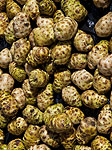 Have you ever looked through the grease-smeared window of the mechanic’s shop? Do you feel like that’s what your eyesight is like all the time? If so, then you may have a cataract. So many older individuals suffer from this condition that it has become the leading vision problem in America. Luckily, you could protect yourself from cataracts with alternative therapies. Just recently, a clinical trial has reported this health news: Indian mulberry, or noni, could be alternative cure for preventing cataracts.
Have you ever looked through the grease-smeared window of the mechanic’s shop? Do you feel like that’s what your eyesight is like all the time? If so, then you may have a cataract. So many older individuals suffer from this condition that it has become the leading vision problem in America. Luckily, you could protect yourself from cataracts with alternative therapies. Just recently, a clinical trial has reported this health news: Indian mulberry, or noni, could be alternative cure for preventing cataracts.
In the clinical trial, researchers studied the anti-cataract activity of selected plants. Among the tested plants, a water extract of Indian mulberry exhibited maximum “aldose reductase” inhibitory activity as compared to other plant extracts. Aldose reductase inhibitors are a class of drugs being studied as a way to prevent eye and nerve damage in people with diabetes. The researchers also found that Indian mulberry possesses significant anti-cataract potential to maintain lens opacity.
Who is likely to get cataracts? There are a few diseases that can encourage their development. Diabetes is one of the primary conditions linked to this eye problem. However, eye injuries or inflammation can also encourage the protein deposits that lead to cataracts, as can some drugs, such as prednisone (a corticosteroid used in inflammatory conditions like arthritis). If you suspect a drug you’re taking may be the cause behind your cataracts, talk to your doctor before stopping any medication.
Another big cause of cataracts is exposure to ultraviolet light and radiation. This is one reason why cataracts may develop as you age. The more years you spend exposed to the rays from the sun, the more likely you are to suffer damage to the lens of the eye. In fact, scientists recently linked the increase in cases of cataracts to the depletion of our ozone layer. So get a good pair sunglasses and wear them as much as you can when outside!
